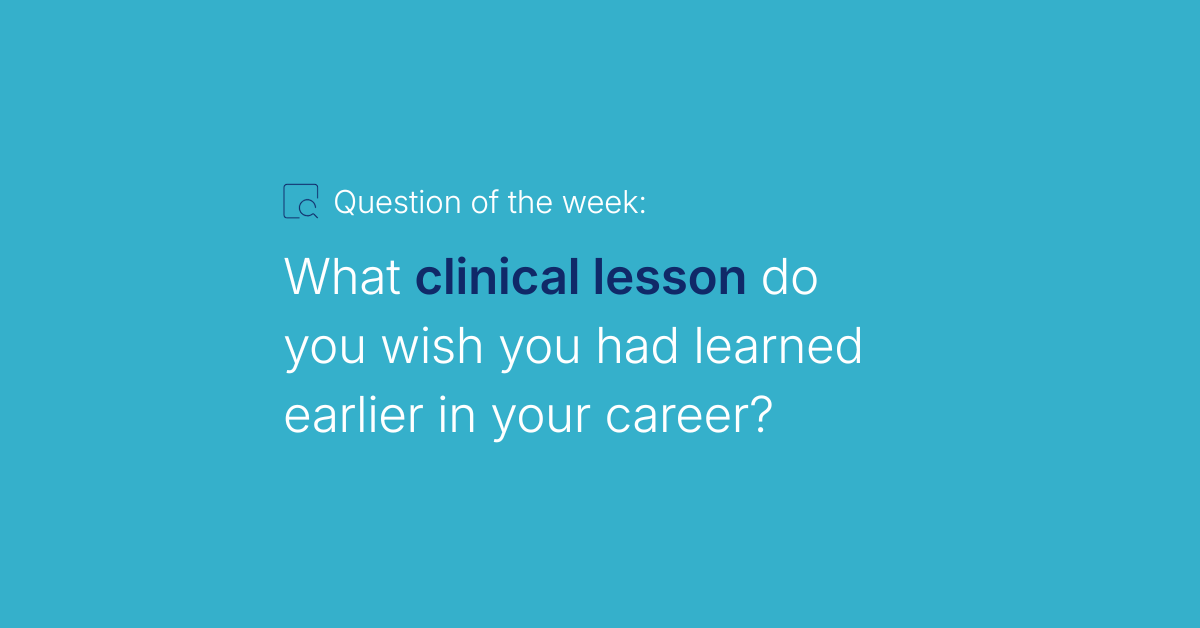
What are the most valuable clinical lessons practitioners have learned?
Practitioners learn some of their most important lessons through real-world experience, not the classroom. From diagnostic nuance to communication strategies, these lessons reflect the realities of practice across specialties.
Wondering what your peers wish they’d known earlier? Read the consults below, then log in or sign up to see the Consensus and share your opinion.



 Question of the week
Question of the week
What clinical lesson do you wish you had learned earlier in your career?
 Consults
Consults
Key takeaways about clinical lessons learned by peers:
- Respect the whole care team
Nurses, aides, and staff are foundational to patient care. Building strong relationships and listening to their expertise can improve clinical outcomes and workplace culture. - Understand the business of medicine
From billing and coding to leadership and finance, non-clinical skills are essential for navigating practice realities and reducing stress, for both providers and patients. - Lead with honesty, boundaries, and empathy
Being transparent with patients, setting professional boundaries, and listening deeply fosters trust and improves satisfaction without compromising care.
Gastroenterology
"The paramount importance of the nurses and aides. Little is said during medical school about the key stakeholders in the hospital or office setting. Newbies need to know that nurses, aides, receptionists, and others are not only the ones who hold the hospital together, but also the ones who hold your office together. Be kind. Listen carefully. Learn from the experts."
Anesthesia/Pain
"Hands down, the business side of medicine - billing, coding, pre-certs & why things will get denied before ordering, etc. Even better, there should be a course on this in medical school. Physicians usually have no clue about the business part of medicine when they start practice, which can lead to much stress & agony for both them & their patients."
Internal Medicine
"When I was a new PA, I was afraid to tell patients that I didn’t know what was going on with them. After years of experience, I am comfortable telling patients that I don’t know exactly the cause of their symptoms, but I will work to try to get to the cause and help them feel better. I find patients find trust in you more when you are just honest but willing to work and fight for them."
Obstetrics/Gynecology
"That oftentimes, listening and some basic counseling can mean more to a patient than diagnostic care alone. Bring prepped for appts and having a plan is great, but pivoting and letting the patient guide the appointment will help me more in the long run and also lead to better patient satisfaction."
Oncology/Hematology
"The best treatment plan is not always the most aggressive one. We are taught that “doing everything possible” to provide the best care is most important. Even when we know the outcome is futile. Giving a last-ditch effort with a chemo that has a 10% response rate with loads of side effects isn't quality care.
With time and experience, I realized that true oncology care means aligning treatment with the patient’s goals, values, and quality of life—and making sure patients fully understand what they are agreeing to in these palliative settings."
Gastroenterology
"Empathy without boundaries is a recipe for problems. This can be with patients/loved ones, allowing behavior that is problematic. It can also be with others in your workplace and lead to others taking advantage of your well-developed skill of empathy."
Internal Medicine
"I wish I had the foresight to have taken leadership courses and an MBA program earlier in my career, even possibly in medical school. Much of my day-to-day work involves leading people and programs, whether clinically or administratively. Also, as a practicing physician, the importance of being savvy with finances and understanding funding streams is so valuable for success, an area not taught in medical school residency programs."
Oncology/Hematology
"We tend to obsess over the 1 thing we should have done differently and not the 99 things we did right. We can do our best to educate patients, but ultimately, we will have a patient who will fall into the rare reported side effect of the treatments we give. We can't predict the future."
Dermatology
"I do feel like earlier in my career. It would’ve been good to try to see less patients per day so that I could get accustomed to patients at a different pace. Sometimes you need the time to be able to look up diagnoses or treatment plans, and seeing less patients could help encourage more confidence for the first few months."
Psychiatry
"I wish I had learned boundary setting a bit earlier in my career. I wish I had also learned earlier that we are not meant to have all the answers as medical providers at all times. It is okay to be honest when we don't know something and need to look into depth with something more ourselves. Also, I wish medical training would stress more that doctors and nurses, and other health practitioners are human."
Review all the lessons shared by our community, or contribute your own, by reading the full post on Healthcasts.

